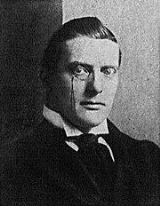
(16 October 1863 – 17 March 1937) was a British statesman
, recipient of the Nobel Peace Prize
and half-brother of Neville Chamberlain
.
Austen Chamberlain was born in Birmingham
, the second child and eldest son of Joseph Chamberlain
, then a rising industrialist and political radical
, later Mayor
of Birmingham and a dominant figure in Liberal
and Unionist
politics at the end of the 19th century. His mother, the former Harriet Kenrick, died in childbirth.
[I believe in] the throne...parliamentary institutions...private enterprise and individual opinion against the socialization of the state...equity in the distribution of public burdens and strict maintenance of public faith with the creditors of the state [and] a fresh guarantee of peace by an alliance with France and...Belgium for the defence of our common interests against unprovoked attack.![]()
The danger which threatens us comes from Labour...Those who think that the Conservative or Unionist Party, standing as such and disavowing its Liberal allies, could return with a working majority are living in a fools paradise and, if they persist, may easily involve themselves and the country in dangers the outcome of which it is hard to predict.![]()
I tell you I look forward with terror to her [Germany] making war upon us again in ten years.![]()
No British Government ever will and ever can risk the bones of a British grenadier.![]()
We have a peculair interest because the true defence of our country, owing to scientific development, is now no longer the Channel...but upon the Rhine.![]()
Scratch me and you will find the Nonconformist.![]()

